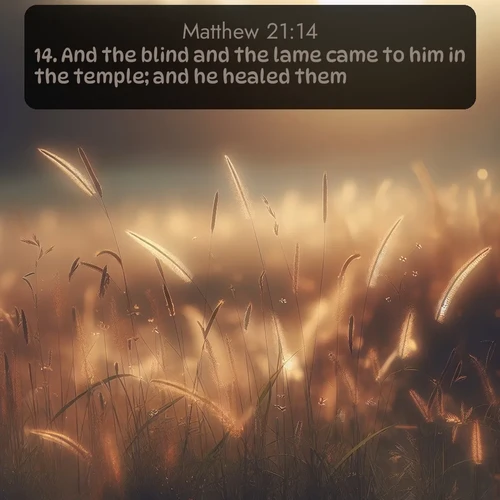Gospel of Matthew 21:14 plusieurs versions / traductions
English Bible Translations
14. And the blind and the broken in body came to him in the Temple, and he made them well.
14. And the blind and the lame came to him in the temple; and he healed them.
14. And there came to him blind and lame men in the temple, and he healed them,
German Bible Translations
French Bible Translations
14. Des aveugles et des boiteux s'approchèrent de lui dans le temple, et il les guérit.
14. Des aveugles et des boiteux s’approchèrent de lui dans le temple. Et il les guérit.
14. Des aveugles et des boiteux s'approchèrent de lui dans le temple. Et il les guérit.
14. Et des aveugles et des boiteux vinrent à lui dans le temple, et il les guérit.
14. Alors des aveugles et des boiteux vinrent à lui dans le Temple, et il les guérit.
14. Alors des aveugles et des boiteux vinrent à lui dans le temple, et il les guérit.
Versions with Strong Codes
Matthew 21 / KJV_Strong14. And[G2532] the blind[G5185] and[G2532] the lame[G5560] came[G4334] to him[G846] in[G1722] the[G3588] temple;[G2411] and[G2532] he healed[G2323] them.[G846]
Strong Code definitions
G2532 kai/kahee apparently, a primary particle, having a copulative and sometimes also a cumulative force; and, also, even, so then, too, etc.; often used in connection (or composition) with other particles or small words:--and, also, both, but, even, for, if, or, so, that, then, therefore, when, yet.
G5185 tuphlos/toof-los' from, 5187; opaque (as if smoky), i.e. (by analogy) blind (physically or mentally):--blind. see G5187
G2532 kai/kahee apparently, a primary particle, having a copulative and sometimes also a cumulative force; and, also, even, so then, too, etc.; often used in connection (or composition) with other particles or small words:--and, also, both, but, even, for, if, or, so, that, then, therefore, when, yet.
G5560 cholos/kho-los' apparently a primary word; "halt", i.e. limping:--cripple, halt, lame.
G4334 proserchomai/pros-er'-khom-ahee from G4314 and 2064 (including its alternate); to approach, i.e. (literally) come near, visit, or (figuratively) worship, assent to:--(as soon as he) come (unto), come thereunto, consent, draw near, go (near, to, unto). see G4314 see G2064
G846 autos/ow-tos' from the particle au (perhaps akin to the base of G109 through the idea of a baffling wind) (backward); the reflexive pronoun self, used (alone or in the comparative 1438) of the third person , and (with the proper personal pronoun) of the other persons:--her, it(-self), one, the other, (mine) own, said, (self-), the) same, ((him-, my-, thy- )self, (your-)selves, she, that, their(-s), them(-selves), there(-at, - by, -in, -into, of, -on, -with), they, (these) things, this (man), those, together, very, which. Compare 848. see G109 see G1438 see G848
G1722 en/en a primary preposition denoting (fixed) position (in place, time or state), and (by implication) instrumentality (medially or constructively), i.e. a relation of rest (intermediate between 1519 and 1537); "in," at, (up-)on, by, etc.:-about, after, against, + almost, X altogether, among, X as, at, before, between, (here-)by (+ all means), for (... sake of), + give self wholly to, (here-)in(-to, -wardly), X mightily, (because) of, (up-)on, (open-)ly, X outwardly, one, X quickly, X shortly, (speedi-)ly, X that, X there(-in, -on), through(-out), (un-)to(-ward), under, when, where(with), while, with(-in). Often used in compounds, with substantially the same import; rarely with verbs of motion, and then not to indicate direction, except (elliptically) by a separate (and different) preposition. see G1519 see G1537
G3588 ho/ho, including the feminine to to in all their inflections; the definite article; the (sometimes to be supplied, at others omitted, in English idiom):--the, this, that, one, he, she, it, etc.
G2411 hieron/hee-er-on' neuter of G2413; a sacred place, i.e. the entire precincts (whereas G3485 denotes the central sanctuary itself) of the Temple (at Jerusalem or elsewhere):--temple. see G2413 see G3485
G2532 kai/kahee apparently, a primary particle, having a copulative and sometimes also a cumulative force; and, also, even, so then, too, etc.; often used in connection (or composition) with other particles or small words:--and, also, both, but, even, for, if, or, so, that, then, therefore, when, yet.
G2323 therapeuo/ther-ap-yoo'-o from the same as G2324; to wait upon menially, i.e. (figuratively) to adore (God), or (specially) to relieve (of disease):--cure, heal, worship. see G2324
G846 autos/ow-tos' from the particle au (perhaps akin to the base of G109 through the idea of a baffling wind) (backward); the reflexive pronoun self, used (alone or in the comparative 1438) of the third person , and (with the proper personal pronoun) of the other persons:--her, it(-self), one, the other, (mine) own, said, (self-), the) same, ((him-, my-, thy- )self, (your-)selves, she, that, their(-s), them(-selves), there(-at, - by, -in, -into, of, -on, -with), they, (these) things, this (man), those, together, very, which. Compare 848. see G109 see G1438 see G848
Prédications qui analysent les thèmes Évangile selon Matthieu 21
Thèmes : L'entrée à Jérusalem; La purification du temple; La parabole des deux fils; La parabole des vignerons méchants; La question sur le tributLes Paraboles #11: Trop tard pour les regrets (La prabole des deux fils, les vignerons homicides)
Related Sermons discussing Gospel of Matthew 21
Themes : L'entrée à Jérusalem; La purification du temple; La parabole des deux fils; La parabole des vignerons méchants; La question sur le tributParables #11: Too late for regrets
see also: Bible Key Verses ; KJV Bible Images, BBE Bible images
playlist des Paraboles sur Youtube ; le Podcast sur Spotify : Les Paraboles : Le Bon Samaritain, Le Fils Prodigue...

